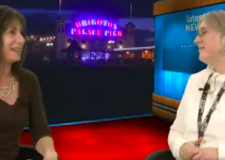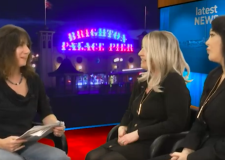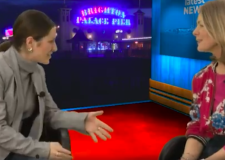Brighton Theatre are reviving their internationally acclaimed play Mozzz! at PierFest on Brighton Palace Pier, Andrew Kay talked to Faynia Williams and Richard Crane about their lives in theatre and the making of new work
You both come from a traditional theatre background but what drew you to a Life on stage in the first place?
Faynia: I don’t come from a traditional theatre background. I won a scholarship to Oxford from school, but chose to run away to RADA instead and get myself a scholarship there, probably because it was a rebellious thing to do, and I loved everything to do with the stage. It was not what good Jewish girls did!
Richard: My father was a priest, my godfather was a bishop. I was a chorister and a server. The ritual, the singing, the candles, the dressing up, led to a love of acting and entertaining. Doing plays was the antidote to sport at school. When I couldn’t find a play to produce, I wrote my own. Similarly at Cambridge, which I treated as a drama school, I wrote my own sketches to get into the Footlights. Fiercely competitive, Cambridge was a microcosm of the industry I was about go into. Student rebellion, the end of censorship, the birth of the Fringe, this was a thrilling time to be starting in theatre.
Who have been the strongest and most influential people in your work?
Faynia: Stephen Joseph whose Theatre in the Round I joined in the late 50s. Tadeusz Kantor, Polish legendary Director and Artist. Richard Demarco asked me to be his Assistant at the main Edinburgh International Festival in 1972, and we became friends and colleagues both in Scotland and Poland from then on. Jozef Beuys…ditto. Actors Alan Rickman, John Hurt, Tom Courtenay, Sam Crane, Grace Loveless, Ian Dury, Tim Robbins.
Richard: Chris Parr, my predecessor as Fellow in Theatre at Bradford, made me write my first professional play. Through him, theatre became, not just entertainment, but a mission. Jonathan Miller who directed me as an actor at Nottingham and was Chair of the Edinburgh Fringe when I and Faynia were on the Board, was an example to aspire to for new ideas, multidisciplines, wit and boundless energy. Actors like Frank Finlay, David Essex, Brenda Blethyn and more recently David Bradley and Anna-Maria Nabirye, have brought my plays to life, as has Faynia Williams who I’ve worked more closely with than anyone.
Did you meet through work?
Faynia: Yes, I took over his job as Fellow in Theatre at Bradford.
Richard: I’d set up a young actor called Tom Wilkinson to succeed me, but he was pipped at the post by the wild card on the short list. Poor Tom then had to go off to Hollywood and become a movie star. It took a while for me to accept that Bradford had made the right choice.
When did you start to work together creating theatre?
Faynia: When we created a show together about the Ballets Russes and ended up getting married and founding Brighton Theatre.
Richard: I had to recast a part in the play we were taking to Edinburgh and Faynia, about to take on the Fellowship, fitted the bill. I got her co-opted onto the Board of the Edinburgh Fringe and we met at meetings. Gradually we got chatting about projects and the rest is history.
Was the progression from actor to writer or director an obvious move for you?
Faynia: Yes, I always preferred being behind the scenes and having control over artistic creation.
Richard: It was necessary. I was an actor in a fringe company in Cork and two actors hadn’t turned up, so we had to revamp the programme. In one day, I wrote a short surreal comedy with songs for the three women in the company. Later, when I needed a new audition speech, I wrote one and pretended it came from an existing play. I then wrote the play.
You are both partners in life and in work, does that affect your relationship, both on and off the stage?
Faynia: That’s exactly what makes both work beyond the ordinary and gives depth and excitement to both.
Richard: Of course, but it’s more complex than you think. We usually begin with a joint idea, then I go off and write the play while Faynia does casting, fund-raising and pre-production. Then I deliver a script and the onus is on her as director, while I become production manager, and/or actor. But it’s never as neat as that. There are passionate ‘discussions’, existential crises, revelations and miracles, with all the family stuff running parallel, to keep real life in view.
Faynia, is Richard an easy actor to direct?
Faynia: No actor worth his salt is easy to direct. But that’s the challenge!
And Richard, is Faynia an easy director to work with?
Richard: She is extremely demanding and pushes you where you never knew you could go. As writer, I try to hold my ground especially over cuts. As an actor I am totally putty in her hands, though I do like to learn all my lines in advance, which is not her preferred way. And lastly, she has a tendency to give notes after the final performance, but that just reminds you that nothing in art is final.
Perhaps more interestingly, where, if ever, do those lines become blurred, there are three threads here, writer, actor, director… do those lines become blurred, can you comfortably combine when making a new work of theatre?
Faynia: We work together because we believe in each other’s creativity and have learnt to give the necessary space to each thread. Yes, we argue and challenge the material and interpretation but that’s the working process.
Richard: There’s nothing comfortable about weaving together a new show. Lots of egos are coming together to create an ensemble event. Generally the bumpier the ride, the more exciting the result. It’s hard to recall a show of ours when there wasn’t a make-or-break crisis of confidence. This is the cliff-edge you have to jump off and either fall or fly.
Over the years your company, Brighton Theatre, has produced a great number of works, broken records and premiered new works and to great acclaim. What drives you forward now as theatre makers?
Faynia: Always wanting to grow, break new barriers, and find new audiences.
Richard: More and more it’s the state of the world, politically and ecologically, but always from an investigative rather than a tub-thumping point of view. Our most recent plays have focussed on the UN’s role in Gaza, the war between man and mosquito, and the plight of bees.
Throughout the pandemic theatre was one of the most affected sectors of society for both theatre professionals and audiences. What did you do to stay creatively active?
Faynia: Work on the next show in its initial stages before others would naturally be involve
Richard: I sat at my desk and finished my memoir GHOST BOY: A PLAYWRIGHT’S PROGRESS, had it published and marketed. I also re-edited EXIT THE QUEEN and saw it performed in a covid-secure reading at Brighton Girls. Three extracts from my play PUSHKIN were filmed and broadcast on line by Brighton Theatre.
Mozzz! was the first part of what seems to be becoming a group of plays, what was the initial inspiration?
Faynia: We were invited to the International Theatre Institute’s Biennial Congress in Brazil, because I was Chair of their Dramatic Theatre Committee. A play about mosquitoes seemed suitable to premiere there. However the Congress was cancelled, so we decided to premiere at the Brighton Festival, our home town, instead.
Richard: I’d got into insects after working with post-doctoral entomologists at the University of Lausanne, dramatising their research into ants and butterflies. Vector-borne diseases like zika and malaria were hitting the headlines, suggesting a drama about mosquitoes. Then I met Councillor Robert Nemeth who introduced me to his bees, and that set EXIT THE QUEEN buzzing.
You took Mozzz! to the Venice Biennale, how did it go down with an international audience?
Faynia: Huge success. Its a very physical production so could be understood easily beyond language
Richard: We were in the gallery of the Ospedale under the aegis of Richard Demarco, who we’d worked with many times in Edinburgh. Mosquitoes famously do not respect national or cultural boundaries. Mozzz! is a vector-borne play and can travel.
Clearly the piece is issue based, and a global issue, how do you make a piece like that work, is it important to balance the message with it being an entertainment?
Faynia: Of course. Its not a piece of propaganda or a lecture. Its a show!
Richard: For me as actor/writer, it’s like returning to revue, and to be doing it at the end of the pier will have the same raw-entertainment challenge as doing stand-up in a bar.
What should audiences expect when they come to see Mozzz! on the pier?
Faynia: Well, Horatio’s Bar is a wonderful space, and Brighton Theatre’s work is as much about creating excitement in the venue as well as in the content and presentation. The idea of entertainment on a Pier is as old as the idea of seaside. So expect fun, surprise, good acting, and, above all, the unexpected.
Richard: ‘A buzzing tour-de-force… a vector-borne delight… spectaular… impeccable…’ – Theatre Review
Your most recent work, Exit The Queen: She’s The Bee’s Knees, premiered at the end of Brighton Fringe, how did the piece evolve?
Faynia: We had looked at man’s worst enemy in the mosquito. Now we wanted to look at man’s best friend in the insect world, the bee. So we found a well known bee keeper, read BUZZZ!, and we were flying….
Richard: The evolution was compulsorily extended due to covid. What should have premiered on the Brighton Fringe 2020 was postponed to the 2021 Fringe which was itself postponed. Then someone got ‘pinged’ and we were postponed again. Yet each postponement was an opportunity to sweeten the honey and sharpen the sting, towards the premiere which happened 30 July 2021.
So Exit The Queen is a progression from Mozzz! which you are now reviving. Are you already working on a third companion piece? Ant? Beetle? Termite…
Faynia: Watch this space!
Richard: It’s under wraps.
Finally, we all have guilty pleasures, what are your theatrical guilty pleasures?
Faynia: Pantomime.
Richard: I loved The Mousetrap – even seeing it again (and again) when I know who did it.
Mozzz! Appears at PierFest on Brighton Palace Pier
20 & 21 September 8pm
For more information and tickets:
rebrand.ly/pierfest





















